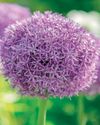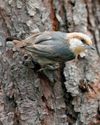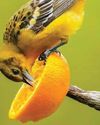
Long-living with showy blooms and a low-maintenance reputation, peonies are model perennials.
They strut their stuff in spring with a parade of flowers in hues of yellow, red, coral, pink, purple and white. But for peonies to truly shine, autumn is the ideal season for planting, transplanting and maintaining them, so they can turn heads for years to come.
Ideal Perennials
With more than 8,000 registered peony cultivars, the Paeonia genus has something for everybody. Hybrids and cultivars of herbaceous peonies (P.lactiflora) often conjure up nostalgia with their delicate, crepe paper-like petals and the subtle fragrance that has perfumed many a grandmother's garden. In spring, their stems poke through the ground before growing into a bushy plant. They eventually die back in late fall and remain dormant over winter.
"Herbaceous peonies tend to be easier to grow and care for," says Nate Bremer, president of the American Peony Society. "Hybrids that produce strong stems which need no support are my favorites."
A top recommendation from Nate is the Etched Salmon cultivar, with long-lasting salmon pink blooms that have the appearance of luscious double peonies.
Woody peonies (P.suffruticosa) are called tree peonies by some, despite being shrubs. They require less sun and aren't as prone to flopping. They often bloom before herbaceous peonies, extending the amount of time peonies can be appreciated in the garden.
"Suffruticosas produce otherworldly flowers and are gorgeous in the early garden," Nate says. "These plants are used by small native bird species, such as chipping sparrows and hummingbirds, as nesting shrubs." Itoh peonies are a cross between woody and herbaceous peonies. These hybrids maintain green foliage late into the fall.
Diese Geschichte stammt aus der October/November 2023-Ausgabe von Birds & Blooms.
Starten Sie Ihre 7-tägige kostenlose Testversion von Magzter GOLD, um auf Tausende kuratierte Premium-Storys sowie über 8.000 Zeitschriften und Zeitungen zuzugreifen.
Bereits Abonnent ? Anmelden
Diese Geschichte stammt aus der October/November 2023-Ausgabe von Birds & Blooms.
Starten Sie Ihre 7-tägige kostenlose Testversion von Magzter GOLD, um auf Tausende kuratierte Premium-Storys sowie über 8.000 Zeitschriften und Zeitungen zuzugreifen.
Bereits Abonnent? Anmelden

Basics of Hydroponics
Use these top tips and plant picks to have a successful soil-free garden

Rooted in Resilience
These hardy perennials will thrive in most zones

Social and Supportive
Brown-headed nuthatches take a helpful approach to raising their young

All About Owl Pellets
And why you should give a hoot about them

Ask the Experts
Advice from our pros about houseplants, bird feeding and more

BRING THE OUTDOORS IN
Making a terrarium is about as close as you can get to a Zen DIY project. Once you have gathered the proper materials and squared away your plant selections, it's as simple as layering it all together and watching your mini ecosystem thrive. Here, I'll walk you through my foolproof process and cover all the required elements for good filtration, healthy soil, strong root growth and resistance against fungus and disease.

GROW THIS. NOT THAT
Six easy-to-grow houseplants—and six that may not be the right choice for you

Winter MAGIC
Forecasts may be frigid, but grab your binoculars because birding opportunities are still incredible

Sense or Nonsense? - Why some birds can taste and smell - but others can't
Does a porcelain berry taste like a blueberry to a gray catbird? Does a block of lard smell like frying bacon to a northern flicker? The short answer is no. While some avian species do have a well-adapted sense of taste or smell, they can't distinguish between flavors and odors the way humans can. They're not picking up every ingredient in the suet you put out, says José Ramírez-Garofalo, an ornithology researcher at Rutgers University in New Jersey and the director of Freshkills Biological Station in Staten Island, New York.

Maple Mania - Amazing facts about this fall foliage mainstay
Amazing facts about this fall foliage mainstay